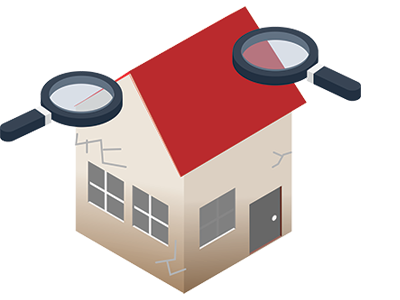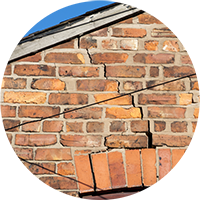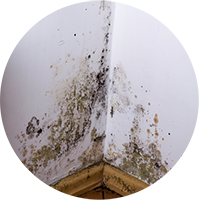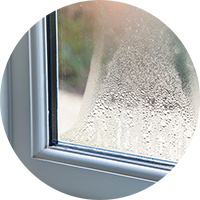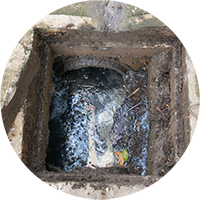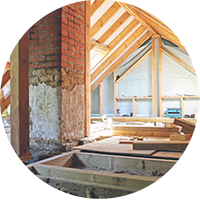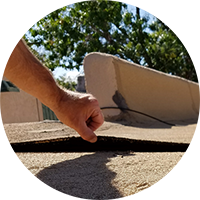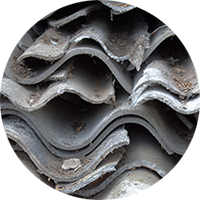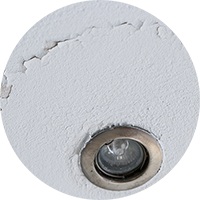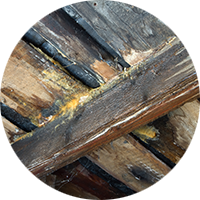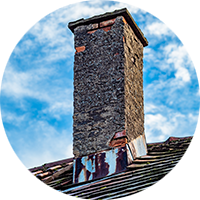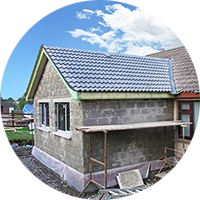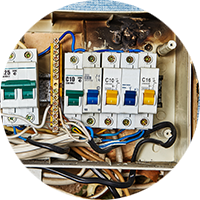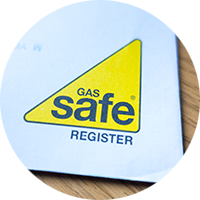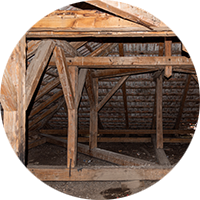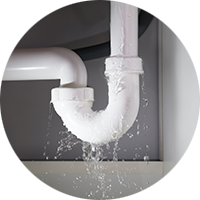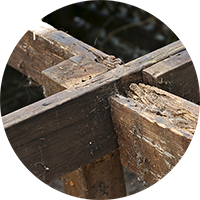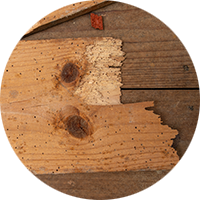House Survey Problems
Property surveys, such as a HomeBuyer Report or Building Survey, are invaluable to buyers. These surveys are essential to avoiding lengthy remediation costs caused by undisclosed housing problems.
Whether it's rotten window frames, roof damage, or more, you’ll need to get a surveyor to thoroughly inspect the property to get ahead of these potential and future risks before they become an expensive problem.
The two problems listed are just two of many housing problems that surveys will pick up.
What housing problems can a survey uncover?
The common house survey problems vary, which is why it’s important to always get an experienced RICS survey to inspect your property. Spotting these issues isn’t always easy and can be difficult to see at first glance.
Here you can find some of the key property defects:
The two main surveys you can get to identify these property survey defects are the HomeBuyer Report (for bungalows, flats and post 1960 house) or a Building Survey (for larger, older or heavily extended properties).
Read on for further information about the main property defects found by RICS surveyors.
Subsidence or signs of movement
Subsidence is the effect of the movement in a property’s foundations. It is the occurrence of the ground lowering and shrinking beneath the house. This can cause movement in the rest of the property, with the possibility of cracks appearing in the walls and ceilings.
If your property does have subsidence, it can cost you tens of thousands to repair. Your property surveyor will be able to inform you during their survey whether the property has subsidence or not.
Important to note: If during a RICS survey subsidence is suspected, then you must instruct a Structural Engineer to inspect the property and confirm what action is required to be taken. This is VERY important as most mortgage lenders will not lend you money if your property has subsidence.
What are the main causes of subsidence?
The following are the main causes of subsidence:
- Trees Close to Property – When trees grow near a property, their roots can both draw water from the soil, making it loose, and they can grow in and around the foundations.
- Mining Area – If the property is built in a mining area, the probability that the ground under the foundations will shift or be more at risk of shifting due to mining works will be much greater.
- Clay Sub-Soils – In dry weather, water is removed from the clay soil, causing it to shrink and the foundations to destabilise. Clay soil is particularly bad for this, as it normally holds a lot of water, and so the removal of water will have more of an effect than other soil types.
- Water Leaking – As much as the removal of water from the soil around the foundations can cause subsidence, water leaking in excess can also cause a problem. Water can wash away soil around the foundations, and this is a particular problem when the ground is made up of sand, gravel or chalky soil.
Rising or penetrating damp
Rising damp is where water is drawn from the ground through bricks, mortar, or sandstone. These are porous materials that will absorb water like a sponge due to potential holes in the material. Penetrating damp occurs when rainwater finds its way into a property through defects in the structure.
Damp can lower the value of a property, which is why it is important to get a house survey done prior, even if damp isn’t noticeable. This is because damp can take years to appear. You will then be faced with the option of asking the seller to treat the house survey problems or renegotiate your offer.
Can damp impact a house purchase?
While it’s not a deal breaker in regard to purchasing a house, damp can still present serious issues that need to be addressed. It’s imperative to assess the severity of the damp and potential treatment cost.
If the damp is causing structural damage or is posing a health risk to people with asthma or other respiratory issues, please proceed with caution. However, it can be resolved relatively easily in many cases. Damp and timber surveys are also recommended for homeowners who have noticed new signs of damp.
What are the visible signs of damp?
While you will need a specialist to diagnose the damp, there are visible signs you can look out for:
- Damaged internal decoration – Damp or discoloured watermarks on internal walls
- Rotting skirting boards or floor boards - wet rot with decay
- Damaged plaster - Disintegration, salting or blistering
- Localised dampness - Dampness on walls rarely exceeds one metre above ground level, but may go much higher in extreme cases
- Damp smell - All kinds of damp have a similar musty smell
Pest Infestation
A pest infestation can be a nightmare for homeowners to deal with. Whether you’re looking to buy, sell, or simply maintain a clean home, understanding the signs of an infestation is crucial. Let’s explore what a pest infestation is and what signs you need to look out for.
What is a pest infestation?
A pest infestation is when pests, insects, rodents, or plants invade your home in large quantities. Their impact on your home is that they can spread diseases, cause property damage, or simply be a problem that you can’t shake.
A RICS surveyor is trained in noticing evidence of various forms of infestation - this is another excellent reason to book a home buyers survey.
Types of infestations in homes
The RICS surveyor will be able to inform you of the many types of infestations that could be in your home. Let’s walk you through the many infestation types you could encounter in your home:
Rats and mice
Rats and mice can be very problematic in your home. They can squeeze through tight gaps, chew on wires, and leave a droppings trail. Once a couple appear, they can turn into a full-blown infestation in no time.
Wet and dry rot
Fungi that thrive in damp conditions can cause serious structural damage to your property. Wet rot is where the timber is damaged due to fungal decay caused by damp conditions. Dry rot is another form of fungi that spreads through dry timber, causing the structure to crumble.
Woodworms or termites
Woodworms are wood-boring beetles that lay eggs in the timber. There are various types of these, including the common furniture beetle, house longhorn, death watch and the wood-boring weevil.
Although termites are less common in the UK due to being more active in warmer climates, they can still be a threat to UK households. Termites devour wood from the inside out. They are a significant problem because they are very hard to detect until it is too late.
Japanese Knotweed
The Japanese Knotweed is an invasive plant that rapidly grows, potentially causing severe damage to building foundations, drains, and roads. It can grow up to 20cm per day, growing through tarmac and concrete.
Some other plants are considered invasive, including Horsetail ferns. These will be flagged in your survey if present.
What are the signs of a pest infestation?
Here are the signs you need to look out for regarding all of the above:
- Rats or mice : Burrowing entrances, droppings, and gnaw marks
- Wet and dry rot: White fungus and white strands on timber and masonry. Dry rot gives out a distinct odour, but wet rot won't spread as much as dry
- Woodworm (Beetles): Jagged markings from tunnels, and dust from the boring
- Termites: Light holes, the appearance of white ant workers, noise caused by eating, and odour
- Japanese Knotweed : Red/purple shoots in Spring, creamy-white flowers in late Summer
Windows and Doors
Poorly installed windows and doors, low quality or deteriorating materials, and inadequate ventilation can lead to openings that cause a draught and or damp. This will make your property significantly colder, leading to an increase in energy bills. Cracks or sticking may indicate more serious issues with subsidence.
The RICS surveyor will be able to help identify any current or potential problems with your windows and doors and how urgent these house problems need fixing. With a level 3 RICS survey, you'll also get an estimate on how much it will cost to fix. Here are the things the survey will look out for when checking the windows and doors:
- Age: Checking how old the windows are
- Rotten Frames: Windows are prone to building up moisture, especially if the frames have started to decay. This is where damp could form which is a big red flag!
- Glazing: The glazing level on windows matters. If you want a warmer house, you'll need to improve the glazing
- Window safety: If the locks are loose or close to falling off, this can pose a security risk to the property and will need changing
- Door damage: If a door can't open properly due to the handle being broken or damage to the structure, this can be a fire hazard as you're delaying the time it takes to leave the property due to faulty door
- Sticking on windows and doors: If the doors and windows stick when opening, this could be a sign that the frame is warped and pose a potential subsidence risk
Electrics
Electrics are one of the most important parts of a property due to the large expenses needed to fix them if issues arise. It's important to note that while a RICS survey will take a look at the electrics, they will not perform testing of the electrics. Therefore, it's important to get a separate electric survey, also know as a EICR, if it's recommended by the surveyor. If you're buying from a landlord, they should have an in-date EICR.
An EICR is typically carried out by a qualified electrician, giving you a clear understanding on the status of your electrics. Here are a few reasons when you should consider booking an EICR:
- The property is more than a few decades old
- The fuse box or consumer unit looks dated
- The house has been extended or altered over time
- There are signs of DIY electrics having been performed
- Sockets, switches, or fittings look damaged or poorly installed
- You can’t find any recent record of an electrical test
Drains and gutters
Faults if left ignored can result in penetrating damp and moderate to severe water damage. Whether that be blockages, cracks, sagging, or failing joints, you're going to need to ensure this system is in working order. A level 2 or level 3 home survey will be able to check whether the gutter is leaking or defective.
If your home surveyor flags a problem with the drains which is inaccessible, you can get a CCTV survey. A CCTV survey is a drainage survey where specialists install high-resolution CCTV into the drains to a problem location, locations, or areas of concern. Once a fault’s been located, engineers can be far more accurate about targeting and fixing a problem without causing further damage to a property.
As for the length of the survey, a small system can take as little as 2 hours. Larger and more complicated drainage systems on bigger properties will take longer.
Gas
As well as electrics, gas is another essential area for testing before purchasing a property. If the boiler has not been installed or serviced properly, this is a significant issue. It's also important to note that a RICS survey will not test the boiler as it's a visual inspection, but they will recommend a gas inspection if it looks old or badly maintained. Here's what a surveyor will check for in regards to gas:
- Obvious Issues : Leaks, corrosion, or any physical damage to the boiler's casing or the surrounding pipework.
- Installation Issues: They will check for evidence of proper ventilation and whether the boiler has been installed correctly according to modern standards.
- Potential Safety Hazards : They will look for any signs of danger, such as a lack of a clear flue or any evidence of carbon monoxide.
Roof
House surveyors will flag in their report if there are any visible problems with your roof. There are a few problems it could be such as leaks, ingress, rot, asbestos, pooling, points of failure, structural integrity, chimney stability, condition of roof coverings including missing tiles, loose tiles or felt, and roofing materials.
If a defect is flagged, you may need a specialist surveyor for intrusive inspection, as a RICS survey is a visual inspection only. However, the home surveyors can climb ladders up to three metres to assess the roof externally.
Asbestos
Asbestos is a naturally occurring fibrous mineral. It was a commonly used building material, particularly as part of cement products, floor tiles and roofing shingles where its durability and resistance to heat were highly valued.
It's very dangerous when inhaled, potentially causing life-threatening illnesses such as Mesothelioma, a rare and aggressive form of asbestos-related cancer. 2500 deaths were also recorded for asbestos-related lung cancer in 2021 according to some estimates.
Both the RICS surveys (Level 3: Building Survey and the Level 2: HomeBuyer Report) will flag up signs of asbestos and recommend an asbestos survey. If you already know there is asbestos, then you should go straight for a specialist survey.
The cost of removing asbestos is significant so understanding the scale of the issue is essential before deciding to proceed with the purchase or renegotiate.
Additional house defects to consider
On top of the defects listed above, there are several other defects that could need correcting before they become more serious.
Flat Roof
Regarding a property extension, that extension may have a flat roof. These have shorter lifespans than tiles and slates, which accompany pitched roofs. Your surveyor may note in your home survey that a flat roof has come to the end of its life.
Chimney Stack
Chimney stacks will often move and deteriorate over time, causing expensive repairs which is not ideal. These are difficult to accomplish because chimneys are difficult to access. Your property survey will indicate deterioration that is likely to cause problems in the near future.
Sagging: Uneven floors
Sagging or uneven floors can cause a serious headache. This is a structural defect that could decrease the safety or the value of the property. If your floors are unsteady, your surveyor will flag whether it's natural settling of the building or indicative of a property defect. This could be a weakened joist due to damp or Woodworm, or insufficient support due to structural changes.
For example, the flooring was strong enough to support the original property structure, but adding another room such as an upstairs bathroom in a previous remodel, it's now sagging under the extra weight.
Insufficient insulation
Proper insulation is essential for keeping your house warm in the cold and cool in hot weather, as well as sound deadening which is crucial if you live near a busy road, for example. Your home surveyor will flag inadequate insulation. However, an intrusive survey may be required to confirm if or what insulation is behind finished walls, floors, or ceilings.
When you book a property survey through SAM Conveyancing, you can be assured that the surveyor you've hired is an expert, with years of experience.
They will work hard to detect if the property you've set your heart on has any problems which might cost you piles of money if you don't act on them.
They can also point you in the direction of other appropriate professionals should a defect require further assessment.
In our recent survey, 16% of homeowners found defects; including 2% who were able to pull out of a bad purchase, 7% who were able to negotiate a better price, and sadly, 7% of homeowners who did not get a survey and discovered defects after the purchase.
12 of the 39 who remembered how much these defects cost to remedy spent over £5,000
Don't burn your money, book a survey.

Andrew started his career in 2000 working within conveyancing solicitor firms and grew hands-on knowledge of a wide variety of conveyancing challenges and solutions. After helping in excess of 50,000 clients in his career, he uses all this experience within his article writing for SAM, mainstream media and his self published book How to Buy a House Without Killing Anyone.
Caragh is an excellent writer and copy editor of books, news articles and editorials. She has written extensively for SAM for a variety of conveyancing, survey, property law and mortgage-related articles.

